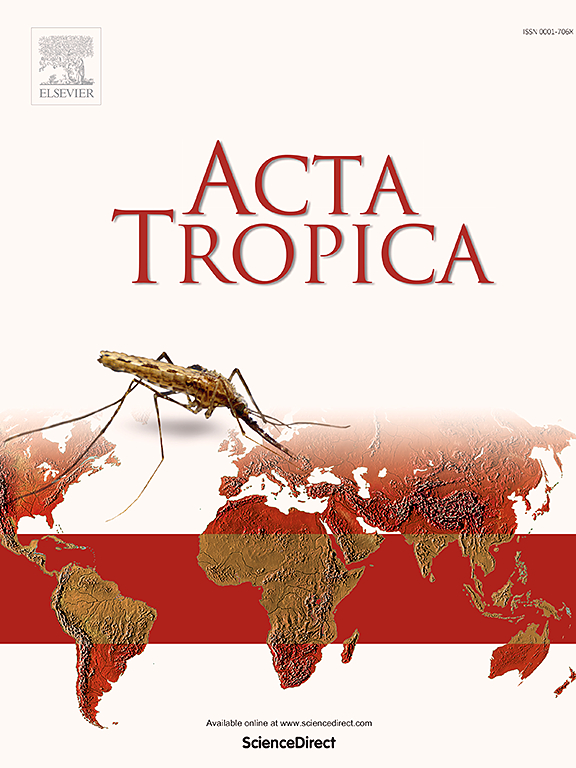Macrophages activate fibroblasts to promote the collagen capsule formation during Trichinella spiralis infection
IF 2.5
3区 医学
Q2 PARASITOLOGY
引用次数: 0
Abstract
Trichinella spiralis (T. spiralis) can establish long-term infections within skeletal muscle cells, which are encapsulated by collagen capsule. Histological studies reveal that T. spiralis-infected muscle cells are surrounded by a significant number of inflammatory cells during the formation of collagen capsules. However, research has focused minimally on the role of inflammation in this process. In this study, mice were orally administered 300 muscle larvae per mouse and were euthanized weekly. The skeletal muscle was harvested. The quantity of macrophages, collagen deposition and the activated state of fibroblasts in the T. spiralis-infected muscle tissue were investigated using Masson’s trichrome staining, immunohistochemistry staining and western blot analysis. The macrophages were co-cultured with fibroblasts. Western blot analysis was conducted to confirm the type I collagen expression of fibroblasts. Then, the collagen deposition and activation status of fibroblasts were further confirmed through macrophage depletion in the infected muscle. The findings demonstrated that the expression levels of type I and IV collagen in the T. spiralis-infected muscle increased. Histological analyses showed a substantial presence of non-parenchymal cells embedded in areas of type I collagen deposition surrounding the infected muscle cells. These non-parenchymal cells included α-SMA+ myofibroblasts and CD206+macrophages. Type I collagen expression in fibroblasts increased when they were co-cultured with macrophages. Specific deletion of macrophages in the infected muscle resulted in reduced collagen deposition and a decreased number of α-SMA+myofibroblasts. These findings reveal that macrophages can regulate the activation of fibroblasts in the T. spiralis-infected muscle, leading to the production of type I collagen that constitutes the collagen capsule.

旋毛虫感染时,巨噬细胞激活成纤维细胞,促进胶原膜形成。
旋毛虫(T. spiralis)可在骨骼肌细胞内建立长期感染,骨骼肌细胞被胶原胶囊包裹。组织学研究表明,螺旋体感染的肌肉细胞在胶原胶囊形成过程中被大量炎症细胞包围。然而,研究很少关注炎症在这一过程中的作用。在这项研究中,每只小鼠口服300只肌肉幼虫,每周实施安乐死。骨骼肌被切除。采用马氏三色染色、免疫组织化学染色和western blot分析螺旋螺旋体感染后肌肉组织中巨噬细胞数量、胶原沉积和成纤维细胞活化状态。巨噬细胞与成纤维细胞共培养。Western blot分析证实成纤维细胞I型胶原蛋白的表达。然后,通过巨噬细胞消耗进一步证实感染肌肉中的胶原沉积和成纤维细胞的激活状态。结果表明,I型和IV型胶原蛋白在螺旋体感染的肌肉中表达水平升高。组织学分析显示,感染肌肉细胞周围的I型胶原沉积区存在大量非实质细胞。这些非实质细胞包括α-SMA+肌成纤维细胞和CD206+巨噬细胞。当成纤维细胞与巨噬细胞共培养时,I型胶原蛋白的表达增加。感染肌肉中巨噬细胞的特异性缺失导致胶原沉积减少,α-SMA+肌成纤维细胞数量减少。这些发现表明,巨噬细胞可以调节螺旋体感染肌肉中成纤维细胞的激活,导致形成胶原胶囊的I型胶原的产生。
本文章由计算机程序翻译,如有差异,请以英文原文为准。
求助全文
约1分钟内获得全文
求助全文
来源期刊

Acta tropica
医学-寄生虫学
CiteScore
5.40
自引率
11.10%
发文量
383
审稿时长
37 days
期刊介绍:
Acta Tropica, is an international journal on infectious diseases that covers public health sciences and biomedical research with particular emphasis on topics relevant to human and animal health in the tropics and the subtropics.
 求助内容:
求助内容: 应助结果提醒方式:
应助结果提醒方式:


